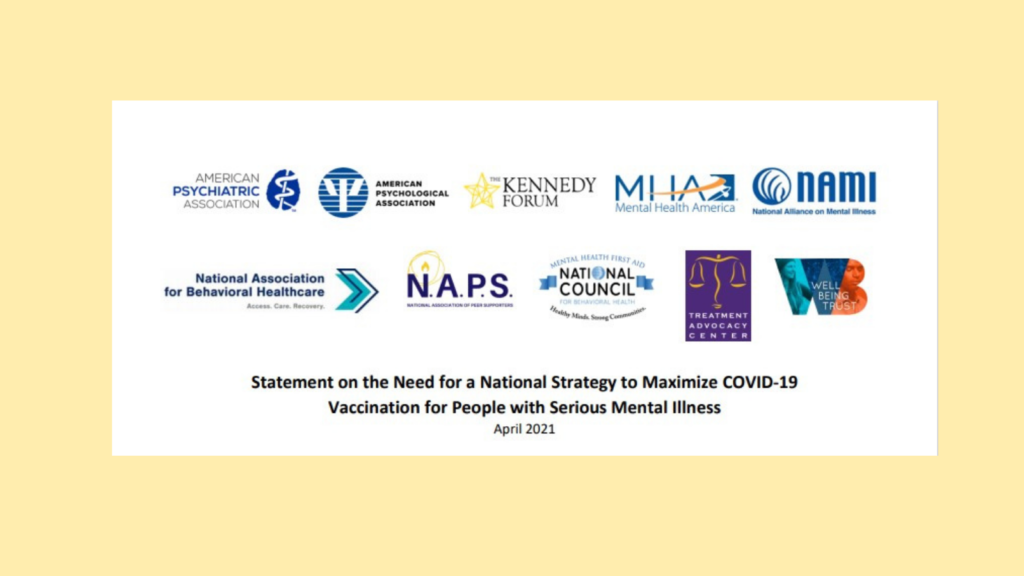Leaders of Mental Health Organizations Issue Statement on the Need for a National Strategy to Maximize COVID-19 Vaccination for People with Serious Mental Illness
The Administration must give urgent, immediate attention to developing and implementing a strategy for vaccinating people with severe mental illness. People with severe mental illness experienced some of the worst mortality disparities pre-pandemic, and are some of the most vulnerable Americans, with a life expectancy up to 25 years lower than the general population. Disparities based on mental illness are often magnified by disparities related to poverty, race or other factors that create barriers to timely health care. New data suggests that many people with severe mental illness will die from preventable COVID-19 infection unless swift action is taken.
Serious mental illness gives rise to an increased risk of infection, hospitalization, and death from COVID-19. Several factors contribute to this increased risk including lack of access to healthcare and housing, obesity linked with medication side effects, and high rates of smoking compared to the population at large.
According to research published in JAMA Psychiatry this January, a schizophrenia diagnosis is the second largest predictor of mortality from COVID-19, after age. This alarming finding means, and leading scientific experts agree, that we must prioritize people with severe mental illness for COVID-19 vaccination.
But vaccinating this population will not be as simple as making those with severe mental illness eligible to seek an appointment. Beyond the limited availability of the COVID-19 vaccine itself, we must address vaccine hesitancy, limited access to health care and overall lack of resources. All of these factors contribute to make it less likely that people with severe mental illness will receive vaccinations without a clear strategy designed to meet their needs.
Only 25% of adults with severe mental illness receive the annual flu vaccine, compared to almost 50% of adults in the general population. Without a strategically designed vaccination program able to bring the vaccine to people with serious mental illness, they will continue to die potentially preventable deaths in greater numbers than the rest of the public from COVID-19.
As states expand the list of qualifying conditions, we must develop strategies that go beyond eligibility alone, which leaves individuals with severe mental illness to both find and obtain the vaccine from a challenging patchwork of providers and does nothing to address myths causing vaccine hesitancy or avoidance of health and mental health care systems due to past negative experiences. We must employ strategies that recognize this context and meet people with SMI where they are. We created a national strategy to bring the vaccine directly to senior citizens in acknowledgment of these challenges, and we must do the same for individuals with severe mental illnesses and specifically address those who may experience multiple disparities based on race, ethnicity and severe mental illness.
As leaders of mental health organizations who have seen the devastating effects of COVID 19 on people with severe mental illness, we ask policy makers and health officials to take immediate action to serve those most at risk. Do not sacrifice individuals with severe mental illness to this pandemic or accept their higher mortality rate as inevitable. People with schizophrenia and bipolar disorder deserve better. We call on our state and national leaders to:
- Immediately include people with serious mental illness in the Phase 1C vaccine priority distribution group, as a threshold issue. CDC guidance on this point should be made available to states, pharmacies, and others distributing and administering the vaccine.
- Provide guidance and funding to state and local health departments to establish COVID-19 vaccination programs specifically designed to increase vaccination rates for people with mental illness. These must include mobile vaccine clinics for aggregate housing facilities, robust outreach to at-risk populations at homeless shelters and encampments, engagement by peer support specialists, training of community health workers, nurses and other public health workers, and efforts to address sources of vaccine hesitancy in this population.
- Allocate vaccines to inpatient psychiatric hospitals, community mental health centers, community behavioral health organizations, and other mental health and substance use service providers who are best positioned to reach those with serious mental illness.
- Include peer support specialists in the public health workforce, including community health centers and public health agencies. Peer support specialists should be deployed to specifically address vaccination-related emotional or mental health stressors for individuals with severe mental illness, including providing educational resources about and support in obtaining and attending vaccination appointments.
- Create multi-media materials for states and local communities to provide education about the importance of vaccination and dispelling myths about vaccine safety tailored to those with serious mental illness.
- Gather and publish data on the vaccination rates of people with severe mental illness and whether subgroups of people who experience multiple disparities are getting access to vaccines.
As President Biden said in his address to the nation on the one-year anniversary of the national shutdown due to COVID-19 on March 11, the most important function of the government is to protect the American people. We must start with those most in need of government action and protection from this deadly virus.
American Psychiatric Association
American Psychological Association
(The) Kennedy Forum
Mental Health America
National Alliance on Mental Illness
National Association for Behavioral Healthcare
National Association of Peer Supporters
National Council for Behavioral Health
Treatment Advocacy Center
Well Being Trust






